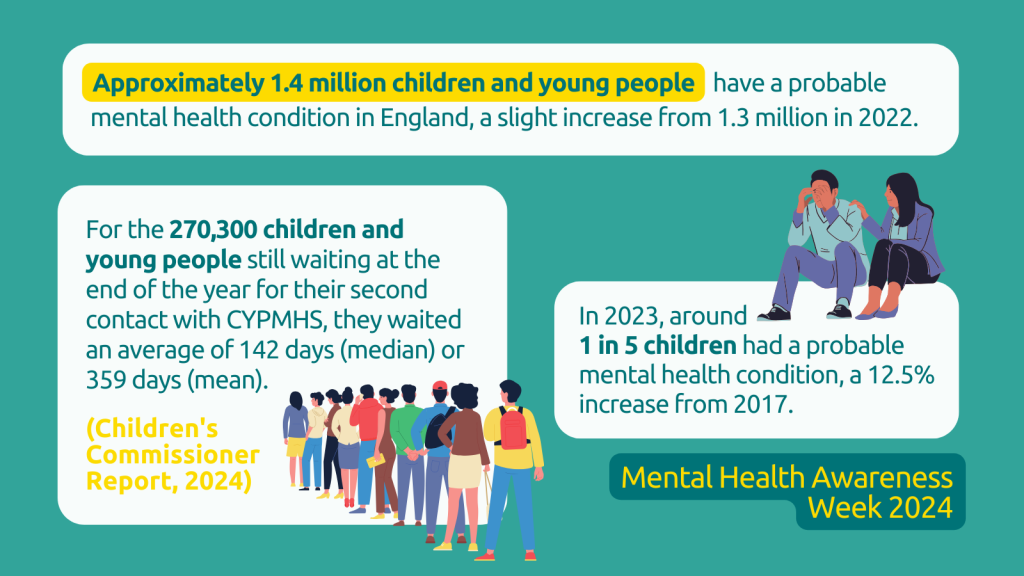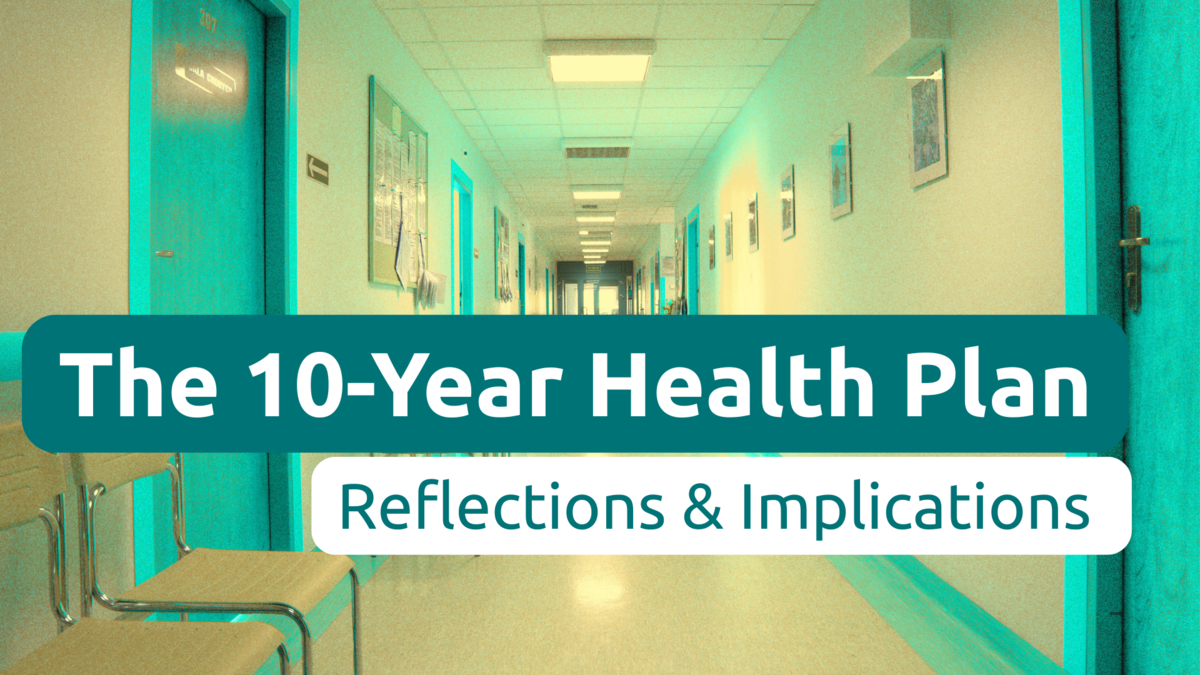
Mental health
8.2 million people in England are living with mental health issues.
Mental health remains one of our campaigning priorities – and we will continue to fight for change where it is needed in the mental health system.
We are concerned that mental health is no longer a political priority.
The spending of local authorities on early help services was halved between 2010 and 2020, whilst demand for mental health support continues to grow.

Our campaigns and policy work
Background to mental health reforms
The 10-year mental health plan is scrapped
In April 2022, the Department of Health and Social Care issued a 12-week call for evidence to inform a new 10-year plan aimed at improving mental health and wellbeing in England. The consultation ran until 7 July 2022.
We were deeply disappointed to hear of the government’s decision to scrap the dedicated 10-year mental health plan.
Read our full response >
The Major Conditions Strategy
The Major Conditions Strategy aims to ensure that mental ill health is considered alongside other physical health conditions and that the interactions between them are reflected in any resulting commitments.
The government assured those who initially responded to the 10-year mental health consultation that their points would be considered with the development of the Strategy and welcomed new contributions.
We submitted a response to the consultation which you can read here.
Our views on the Major Conditions Strategy
We are concerned that a one-size-fits-all Major Conditions Strategy will fail to address a rapidly escalating crisis in mental health adequately.
In August 2023, the government published an interim report setting out the case for change and a strategic framework for the final strategy.
What happened to the Strategy?
In September 2023, the government confirmed that the new Major Conditions Strategy would be published in early 2024. However, Public health minister Andrew Gwynne said that work on the Major Conditions strategy has been paused as the Government evaluates its future plans for the NHS:
‘As of July 2024, work on the Major Conditions Strategy has been paused. As we develop our plans to rebuild the NHS, we will consider how we incorporate the findings from the Major Conditions Strategy into our plans.’
The 10-Year Health Plan
In July 2025, the Government released the 10-Year Health Plan, outlining an ambitious vision to modernise care, bring services closer to home, and empower patients using technology and prevention.
Read our blog here.
We, along with others across the sector, had hoped to see bold and comprehensive plans to reform the UK’s mental health care system. This is especially important as rates of poor mental health continue to rise, alongside an increasing number of people claiming benefits due to mental health conditions. A joined-up, well-funded mental health strategy is urgently needed to meet growing demand and support people before they reach crisis point.
However, although the plan proposes small-scale actions to target mental health, there appears to be no clear integration of mental health into wider system reforms or funding changes.
This lack of clarity is concerning, especially as the standalone Mental Health Strategy and the Major Conditions Strategy were both scrapped in favour of the Health Plan.
Additionally, the plan doesn’t acknowledge the key socio-economic factors contributing to poor health and lower life expectancy, such as poverty, inadequate housing, and care entry rates.
Social care and mental health must be treated as equal priorities, placing clear reform plans and sustainable funding at the forefront of the health plan.
Meaningful change will come from genuine cross-sector collaboration, not just NHS-led initiatives.

Emotionally Based School Avoidance (EBSA)
Understanding Emotionally Based School Avoidance (EBSA)
We’ve launched a new research project exploring Emotionally Based School Avoidance (EBSA) across Greater Manchester. Led by our volunteer Research Assistant, Chantelle, the project aims to understand the reality of EBSA by listening to families and professionals across the region.
Why now?
More families are coming to our SENDIASS services in Stockport and Tameside for support with EBSA. Schools are telling us they’re struggling to respond, and long waits for CAMHS are leaving children without the help they need. Early intervention and system change are urgently needed.
What is EBSA?
EBSA is a term used to describe children and young people who struggle to attend school due to emotional distress. It’s often rooted in anxiety, but there’s no single cause.
A range of issues, including mental health needs, friendship difficulties, or unmet SEND needs, can lead to children experiencing EBSA.
These young people are not avoiding school out of defiance but because they feel overwhelmed and unable to cope.
The impact on children
School avoidance may bring short-term relief, but it often leads to isolation, missed learning and growing anxiety. Without support, it can spiral into long-term absence, making reintegration harder and harming a child’s wellbeing and future.
What we’re doing
Our research is focused on listening: we’re gathering experiences from families, schools and professionals to understand the scale of the issue and what needs to change. The goal is to develop practical recommendations for schools and local authorities that facilitate better, earlier support.
Latest campaign updates
-

Breaking Down the Barriers to Education: New Guidance to Support Children Experiencing EBSA
Across the country, more children and young people are struggling to attend school because of Emotionally Based School Avoidance (EBSA).…
-

School Census 2025: What it tells us about SEND and attendance
The Children’s Commissioner’s recent School Census, covering over half a million children, gives one of the most comprehensive pictures yet…
-

The 10-Year Health Plan: Reflections & Implications
The new 10-Year Health Plan outlines an ambitious vision to modernise care, bring services closer to home, and empower patients using technology…
-

New Research Project: Understanding Emotionally Based School Avoidance
We’ve recently launched a research project focused on Emotionally Based School Avoidance (EBSA) across Greater Manchester with our Research Assistant…
-

Mental Health Awareness Week: What’s the status of children’s mental health services in the UK?
In March 2024, the Children’s Commissioner published a report on children’s mental health services. In light of Mental Health Awareness Week, this blog…
-

Spotlight on care leavers’ mental health this Mental Health Week 2024
It’s Mental Health Week (5–11 February) and an opportunity to shed light on the mental health of care leavers. Care leavers…
Learn about our other campaigns
-

SEND Reforms
: SEND ReformsThe way children and young people with special educational needs and disabilities (SEND) are supported in England is not fit…
-

Mental Health
: Mental HealthMental health remains one of our campaigning priorities – and we will continue to fight for change where it is…
-

Children in Care and Care Leavers
: Children in Care and Care LeaversWe believe that every child in care should be guaranteed care up to the age of 18. Still, thousands of…
-

GM Rail Access
: GM Rail AccessWe believe accessible travel is essential for disabled people to live full and independent lives.
